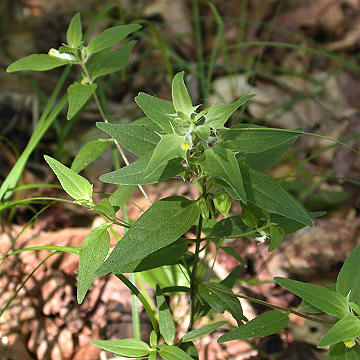

Melampyrum lineare - (image 1 of 5)
Taxonomy
Family: Orobanchaceae
Formerly placed in the Scrophulariaceae but moved to Orobanchaceae along with many other hemiparasitic species that tend to darken considerably when pressed.
Habitat
Woods, barrens, fields, also occurring in peatlands in the northern part of its range.
Associates
Distribution
Labrador to British Columbia, south to VA, OH, northern IN, and MN, along mountains to GA.
Morphology
Herbaceous hemiparasitic perennial; stems simple or often branched, 10-40 cm; cauline leaves below the branches oblanceolate to spatulate, often deciduous by anthesis; leaves subtending the branches sessile or short-petiolate, 2-6 cm, narrowly linear to lance-ovate; bracteal leaves often laciniately toothed near the base; calyx lobes subulate, long than the tube; corolla 6-12 mm, white with a yellow palate.
Notes
Flowers June to August
Wetland indicator: FACU
The genus name means "black bread" in reference to the former use as an additive to flour that would cause bread made with it to be very dark in color.
References
Gleason, Henry A. and A. Cronquist. 1991. Manual of Vascular Plants of
Northeastern United States
and Adjacent Canada. Second Ed.
The New York Botanical Garden. Bronx, NY
|
Michael Hough © 2018 |